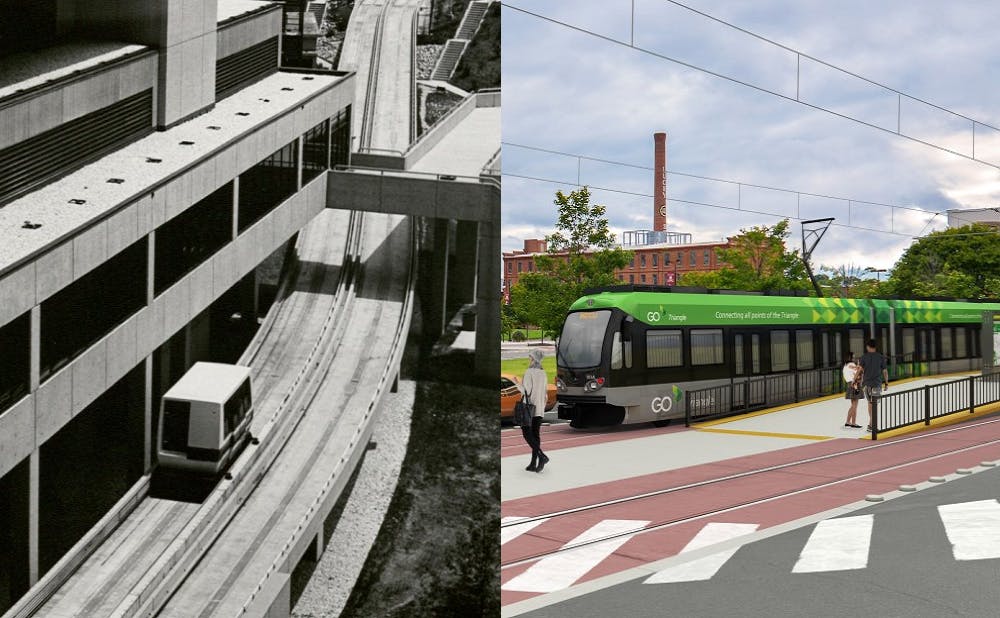When I was a kid, I was always excited by the chance to visit Duke’s campus. The reason? The prospect of riding the PRT.
For those who may not be familiar, the PRT—an acronym for Personal Rapid Transit—was a tram system that ran about a quarter mile between Duke South, Duke North and a parking garage across the street from the hospitals. The vehicles floated on a bed of compressed air and moved via linear induction system that propelled them along guideways.
It was a futuristic achievement that was technologically sophisticated for its time. More importantly, it was built out of a sense of aspiration—to use a transportation project to create a better, more connected Duke.
“The reason for the PRT was to solve the problem of ‘making one hospital out of two physical plants,’” The Chronicle wrote in 1979 to announce its opening.
By the mid-90s, the system carried 3,000 patients and passengers daily in and around Duke Hospital, according to an article in the Herald Sun. For a variety of reasons including hospital expansion and aging infrastructure, the system was decommissioned in 2009. In some ways, it was a victim of its own success. The hospital’s operations were now so intertwined between campuses that it was less necessary.
This year is the 40th anniversary of the inauguration of the PRT. But it is also the year Duke must make some important decisions regarding the future of another transit system: the Durham-Orange Light Rail Transit project. Unfortunately, Duke’s refusal to sign a cooperative agreement in support of the project in time for an important Feb. 28 deadline is putting the project’s entire fate in peril.
During ongoing negotiations, Duke has raised numerous issues with the proposal, and community leaders have responded thoughtfully. Although it is fair for the University to express concerns about the project as a major stakeholder, the administration’s 11th-hour litany of complaints is frustrating. It’s hard not to see this as an effort to disrupt the project or as a negotiating tactic to secure more taxpayer-funded concessions. At the very least, it would have been more prudent for Duke’s relationship with our community to raise these concerns earlier.
Whatever their motivation, the concerns raised—which include traffic interruptions, vibration and electromagnetic interference—are primarily technical in nature. Solutions exist and are already working in other communities around the world.
Years ago, when designing and building the PRT, Duke’s team did not shy away from such technical challenges.
The system was heralded in a NASA publication for its use of a buffering technology developed by engineers to assist with moon landings. It employed complex microprocessors to provide automation and interface with a central control room. And its builders even included a drawbridge to allow coal train cars to access Duke’s steam plant. The aspirational vision for an interconnected healthcare system was achieved because of these innovations.
What is so important about the light rail system—even though it will come at a major cost—is that it will serve to guide our region’s growth in productive ways over the next decades. It is part of our aspirational vision as a community, one that Durham voters overwhelmingly approved in a 2011 tax referendum.
To be sure, light rail is not a cure-all for the challenges the Durham community faces, but it is an important tool to drive dense, diverse and liveable growth in the city we love. And it is part of a vision Duke should lead rather than derail. Someday soon, kids, employees and families from the community could be arriving on campus in a train. That’s the vision — a more interconnected Duke and Durham.
Adam Beyer is a member of the Class of 2018.
Get The Chronicle straight to your inbox
Signup for our weekly newsletter. Cancel at any time.
Adam Beyer is a senior public policy major and is The Chronicle's Digital Strategy Team director.

